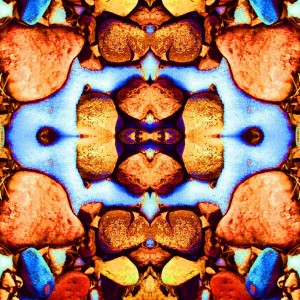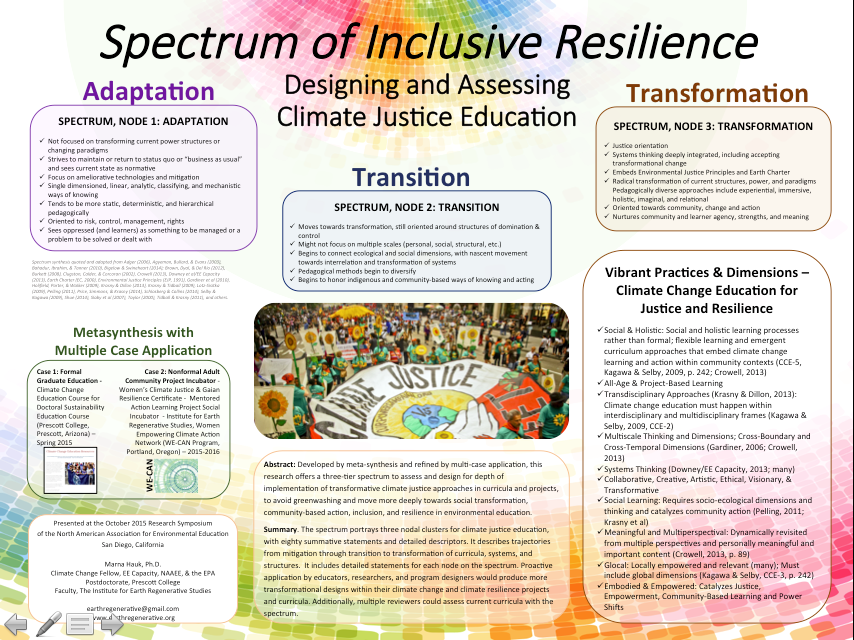By Marna Hauk, Jayanna Killingsworth, Julie Malone, Zoe Nelsen, Tamara Wells, Mandisa Amber Wood
This article was selected as a feature article by Kosmos Journal earlier this year and appears in its entirety here: http://www.kosmosjournal.org/reader-essay/regenerative-design-education-living-praxis-with-a-friendly-universe/
We seek not rest but transformation.
We are dancing through each other as doorways.
We are ripples crossing and fusing, journeying and returning
from the core of the apple, the eye of the mandala,
the cave in the heart of the rose,
the circle without boundaries centered on silence.
–Marge Piercy, from “Circling”
We design enfolded in the rich, transdisciplinary rise and texture of the encircling Earth, which is also our body, which is also the uncoiling possibility spaces of thriving. Regenerative design is a set of living systems design approaches that offers a wide-armed embrace of related ecomimetic and systems design practices including sustainability, permaculture, whole systems, biomimetic, and ecological design. Participants in a graduate course at Prescott College describe some of the key strengths of designing, beyond sustainability, for regeneration. These groundswelling approaches can inspire living buildings and regenerative architecture, and guide ecosocial planning and design at multiple scales for social justice integration and biocultural thriving.
Regenerative Systems Design Lens: Benevolent, Creative, Friendly Universe
The first principle of social permaculture is that the universe is inherently benevolent and creative (Aal & Adair, 2008). In our graduate course we held universal friendliness as a key design principle. We co-authored this collaborative inquiry with the idea of benevolent, creative universe as a design lens for the three practices of regenerative systems design we explore.Creative Flow in Regenerative Design
Active engagement in creative flow requires an intuitive, reflective, and expansive appreciation for the energetic systems and socially constructed realities design both promotes and challenges. The creative cycle is an intuitive process that requires aesthetical feedback and understanding while letting go, exploring the unknown areas of inner and outer worlds. The ability to replicate, through various forms of art, the intricate and seemingly eccentric ways of nature demands attention to the source.The exploration of one’s personal creative flow offers opportunities for considering intentional interactions that are rooted in a desire to create and reflect universal kindness, a source of infinite patterns, rhythms, tones, and pulsating energies, all fractalized harmoniously (see Figure 1).
Relationships also ask for a quality of presence and commitment, advocacy and refinement. We let go into the unknown while maintaining trust in our universal interconnectedness. Futurists such as Soleri and Callebaut can contribute to regenerative design through art, architecture, urban planning, biomimicry, and ecology by creating living systems for sustainable actions.
Regenerative Design Prompt 1: Connect it. Visualize and design to strengthen the hidden or potential flows of connection, kinship, relationship, gratitude, and synergy.
Honoring Feedback
Honoring feedback includes activating and opening to the reverberance of the cosmos in and through design colleagues, inspired by universal friendliness. Feedback is present in all aspects of experience. From the naturally occurring processes around us to the music we choose and the interactions we have with others. The systems within our bodies continually provide subtle feedback to sustain life. When such processes fail, we struggle to survive; when we learn to turn this wisdom inside out, we thrive.Honoring feedback requires self-knowledge and reflection as well as a willingness to listen with empathetic openness to the learning needs of others. Feedback allows for ecosocial systems corrections, reduction of frictions, and the nourishment of brave and creative collaboration. Reverberance is a quality of feedback that happens concurrently at multiple scales and in amplifying emergence. Designs honoring our feelings saturated in contexts of biocultural depth, meaning, and embedment catalyze the regeneration of Earth within, which we might think of as Earth congruence, Earth empathy, or Earth reverberance.
Regenerative Design Prompt 2: Cycle it. Close three loops to allow your design to speak with itself. Generate positive feedback.
Embodied Practice
Embodied practice opens the flows of feedback through the physical, emotional, and relational experience of interacting with learning, meaning-making, and active participation in the adaptive co-creation of reality with all members of a given community, including the more-than-human world. This practice reconciles the often privileged rational stream of perception and decision-making with many other flows of available information. Each practitioner becomes a network of integrated perceptions, responses, and ideas in and of themselves, within a greater network of individuals participating in cooperative community creativity.Regenerative Design Prompt 3: Thrive it. Embed yourself within the Earthly matrix, and within the design process and design.
Conclusion
Regenerative design views the generation of these vibrant, bioculturally responsive meshes as vital and congruent in both process and form. The designs and designer-context-Gaian mesh-bodies become a portalway of multispecies collaborative embodiment and co-presence.Regenerative designs can encourage the interconnection between people and the dynamic forces of nature through regenerative curriculum, art, architecture, agriculture, rituals, and community engagement. Through universal friendliness, regenerative design holds the potential to decentralize inequities in wealth and power and ensure Earthly thriving.



